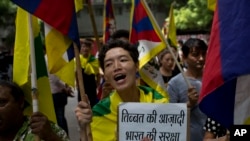India and China have reached an agreement to end the most serious dispute in years between the Asian powers.
The two sides agreed to settle a border dispute at Doklam in the eastern Himalayas. Increased tensions there had raised fears of a wider conflict between the two countries.
India’s foreign ministry says the decision followed diplomatic communications between Chinese and Indian officials.
A quick removal of border personnel from the disputed area at Doklam “has been agreed to and is on-going,” said a ministry statement on Monday. It added that, “We were able to express our views and convey our concerns and interests."
China’s foreign ministry said that Chinese soldiers will continue to patrol the area. A foreign ministry official said "China will continue to exercise sovereignty rights to protect territorial sovereignty in accordance with the rules of the historical boundary."
The announcement comes days before Indian Prime Minister Narendra Modi is expected to travel to China for meetings of the group of nations known as BRICS (Brazil, Russia, India, China and South Africa). These talks are to take place next week.
The timing of the BRICS summit had put pressure on China and India to find a solution before Modi’s visit.
The dispute over the Doklam plateau in the Himalayas started two-and-one-half months ago. It has lasted much longer than earlier border conflicts between China and India. The two sides disagree about other parts of their 3,500 kilometer long border.
The conflict began when Indian troops prevented China from building a road at Doklam, a plateau disputed between China and Bhutan. Since then, about 300 troops from each side have been sent to the area. This has raised fears of a larger conflict. India has refused to leave the territory. It fears that Chinese control of the plateau would give China easy access to a small piece of land connecting central India to the country’s northeast.
China has accused India of entering its territory. The Indian government, however, has claimed that the plateau was disputed territory between Bhutan and China. India also said its forces had moved in to help its small neighbor.
India wanted both countries to remove their troops. China had demanded that India pull its troops back from the disputed area. Chinese media also called on India to remember its defeat in a war fought between the two sides in 1962.
In China, a spokesperson said, "China hopes India respects the historical boundary and works with China to protect peace along the border on the basis of mutual respect of each other's sovereignty."
Commentators in India welcomed the decision on Monday. They said both sides appeared to have found a face-saving solution.
Former India diplomat K.C. Singh told NDTV television India would not object to Chinese troops guarding the area because they did so in the past also.
Singh also said, "What they (India and Bhutan) have objected to is changing the status quo, which is building a road.”
I’m Phil Dierking.
Anjana Pasricha reported on this story for VOANews.com. Phil Dierking adapted her report for VOA Learning English. George Grow was the editor.
What do you think is the best way for countries to resolve border conflicts? We want to hear from you. Write to us in the Comments Section or on our Facebook page.
______________________________________________________________
Words in This Story
convey - v. to make (something) known to someone
patrol - v. to walk or go around or through especially in order to make sure that it is safe
plateau - n. a large flat area of land that is higher than other areas of land that surround it
sovereignty - n. a country's independent authority and the right to govern itself
accordance - n. in a way that agrees with or follows something, such as a rule or request)
access - n. a way of getting near, at, or to something or someone
mutual - adj. shared between two or more people or groups
face-saving - adj. done to keep someone from looking foolish
status quo - n. the way things are now






